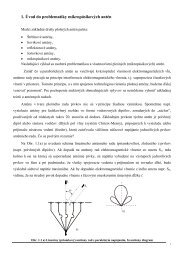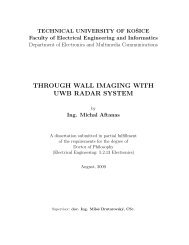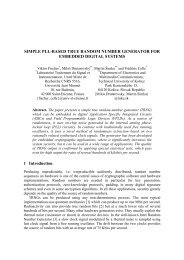CANoe DENoe - KEMT FEI TUKE
CANoe DENoe - KEMT FEI TUKE
CANoe DENoe - KEMT FEI TUKE
You also want an ePaper? Increase the reach of your titles
YUMPU automatically turns print PDFs into web optimized ePapers that Google loves.
66<br />
ates smaller log files. When ASCII format is chosen, the data are saved as readable<br />
text. The setting of the global switch determines whether decimal or hexadecimal representation<br />
is used. Among other things, ASCII format can be used for data exchange<br />
with external programs or for incorporating trace data into documents.<br />
The Offline mode data source can be configured to be either binary or ASCII files.<br />
The automatically preset extension of the file name is .LOG for a binary log file or<br />
.ASC for an ASCII file. The recommended default name is <strong>CANoe</strong>.LOG or CA-<br />
Noe.ASC.<br />
To view or edit an ASCII file, double click the file icon or press the [Edit file] button in<br />
the configuration dialog for the log file. You can use your own text editor for this. To<br />
do this, enter the following line in section [Environment] of the file CAN.INI:<br />
LogEditor=MYEDITOR.EXE<br />
whereby you must enter the name of your own editor for MYEDITOR.EXE.<br />
With the check box Increment logging file you can indicate, that the name of the<br />
logging file is automatically incremented at start of measurement or after each trigger<br />
block, after reaching a defined file size or after reaching a defined duration. This prevents<br />
overwriting files that already exist.<br />
In the configuration dialog you can indicate whether data losses in overload situations<br />
should be reported to you. In the log file, the faulty lines are marked with a ‘*’ as a<br />
special symbol.<br />
Note: Analogous to output in the Write window with the CAPL function write(),<br />
you can output text lines from CAPL programs to ASCII log files using the<br />
functions writeToLog() and writeToLogEx().<br />
2.7.3 Event Types in Log Files<br />
In the following table you will find an overview of all events that are recorded in the<br />
log file. When the function Log internal events is active in the file icon's configuration<br />
dialog the internal events generated by the program (e.g. bus statistics information,<br />
triggers, changes to environment variables etc.) are also logged. To have bus<br />
statistics information generated the relevant option must be activated in the Card and<br />
Driver Options dialog. There you also set how frequently these events should be<br />
generated.<br />
In the first column you will find all event types that are recorded by logging. In the second<br />
column is the format of the particular event in ASCII logging. The third column provides<br />
information on whether the event can also be recorded in binary MDF log files.<br />
You can determine from the last column whether the function Log internal event must<br />
be activated to log the event.<br />
Event type Format in ASCII Logging Binary Comments<br />
CAN message <br />
<br />
© Vector Informatik GmbH <strong>CANoe</strong>/<strong>DENoe</strong> Manual Version 4.1.1<br />
Yes








